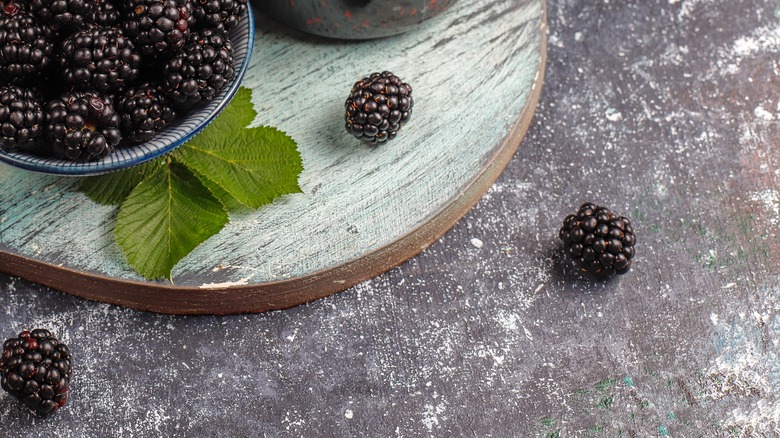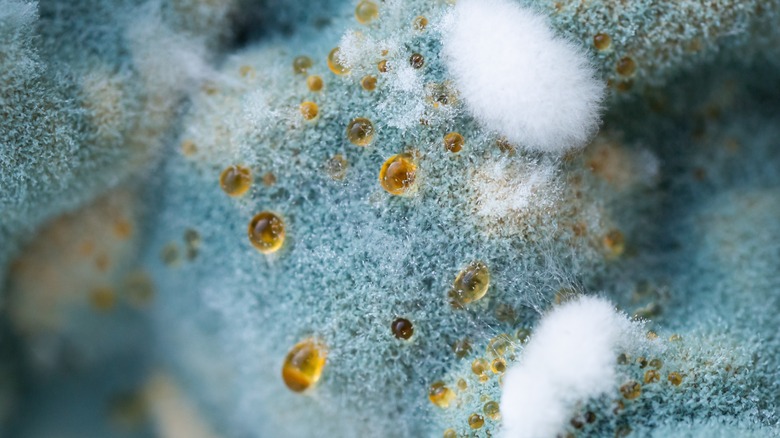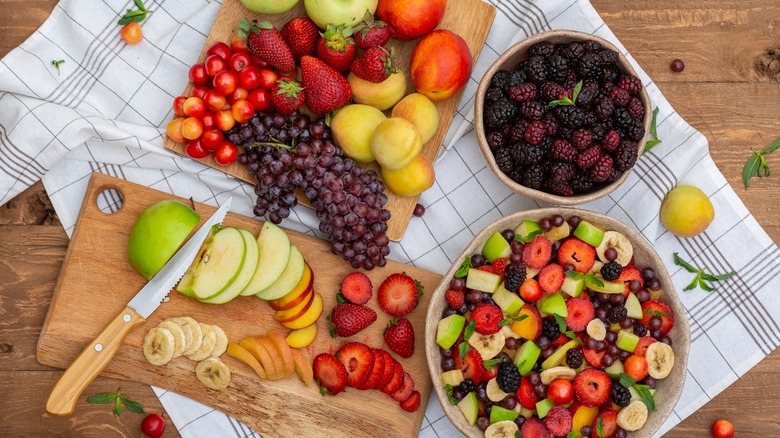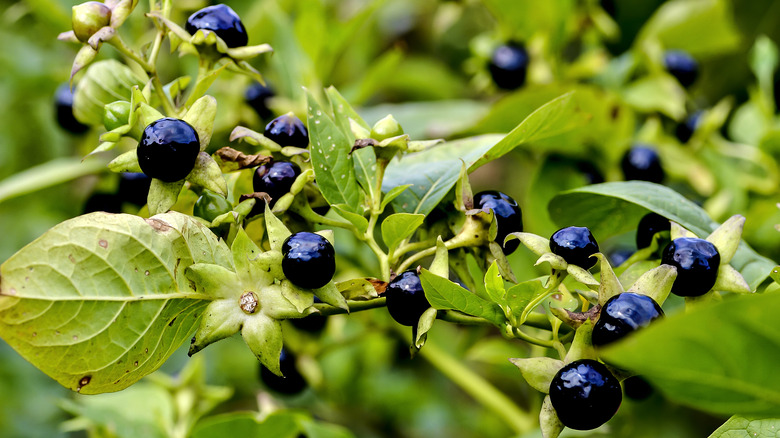The Unexpected Reason Blackberries May Not Agree With Your Stomach
Blackberries belong to the Rosaceae plant family and are one of the most popular types of berries in the U.S., with over $650 million in sales in 2019, per a 2020 study published in the journal Genetics Society of America. Certainly, blackberry's patronage is worth all the hype. Besides its juicy taste, there are claims of its numerous health benefits. According to Healthline, a cup of blackberries has 30.2 milligrams of vitamin C, which is known to have wound healing and skin regeneration benefits. In addition, blackberries are a high-fiber food, helping to reduce cholesterol and encourage regular bowel movements.
According to Medical News Today, blackberries are an excellent source of antioxidants, which may help prevent cell damage from free radicals and reduce your susceptibility to heart problems and other health conditions. And since blackberries also contain anthocyanins, they might help increase blood flow to the brain to improve memory abilities, especially if you have been diagnosed with mild or moderate dementia, says the Cleveland Clinic.
Despite the many nutritional benefits of blackberries, they may pose unexpected side effects like diarrhea and stomach upset. Here are a few reasons why.
Salicylate allergy or sensitivity from blackberries
Salicylate sensitivity or intolerance isn't as well-known as gluten and lactose intolerance; however, it's a reality for many people. A salicylate is a type of salt or ester of salicylic acid found in certain plants, which protects them against insects and diseases (via Drugs.com). Apart from their protective properties that help with food preservation, salicylates may have bacteriostatic, fungicidal, and keratolytic properties, which make them effective in relieving pain, high temperature, or inflammation. Interestingly, many over-the-counter drugs, like aspirin, contain salicylates and are often prescribed for pain, fever, or inflammation (via Medline Plus).
Foods that contain salicylates can cause allergies, and swelling of different organs, says WebMD. According to Healthline, many vegetables, spices, and fruits, like blackberries, are high in salicylates, especially when dried. The amount of salicylate in these foods may vary depending on growing conditions, preparations, and level of ripeness, says Healthline.
Contaminated blackberries can cause food poisoning
The World Health Organization (WHO) estimates that each year around the world, approximately 600 million people (1 in 10) become sick after consuming contaminated foods. Further stats show that food poisoning affects 48 million people in the United States, and kills 3,000 people annually, according to the Centers for Disease Control and Prevention (CDC). Food poisoning is defined as any illness or disease caused by eating contaminated foods and produce (via Cleveland Clinic). Bacteria, like E. coli, are a common cause of food poisoning but it can also be caused by parasites, viruses, funguses, and chemicals.
If unwashed or contaminated blackberries cause you to develop food poisoning, you may experience typical symptoms such as stomach pain, diarrhea, nausea, and vomiting. Generally speaking, diarrhea and other related symptoms like vomiting and fever are usual ways your body purges toxins found in contaminated food, according to the Cleveland Clinic.
Moldy blackberries contain toxins
As previously stated, you can also get food poisoning from funguses, like mold. Mold forms visible, thread-like structures and can also change the shape and texture of the contaminated food, per Healthline. Beyond appearance, mold can also attract invisible bacteria and can produce mycotoxins, especially in nuts and dried fruits, per WebMD. Mycotoxins are poisonous substances that can damage your immune system and lungs and cause digestion challenges.
Although mold can also grow on all foods, fresh foods with high water content, like berries, are more prone to develop mold, says Healthline. Sometimes, you might be tempted to cut away the affected portion of the fruit, but this may not get rid of all contamination, especially if the mold carries harmful bacteria (via the Cleveland Clinic). The same applies even in areas of food where you can't see the mold and are tempted to isolate those from the affected ones. So even if you have a carton of blackberries with mold developing on only a few pieces, the entire package may be contaminated even if you can't see the fuzzy growth of mold anywhere else, says the clinic.
Blackberry is a FODMAP food
FODMAP is a scientific term for carbohydrates and translates to fermentable oligosaccharides, disaccharides, monosaccharides, and polyols (via Johns Hopkins Medicine). Since it's difficult for the small intestine to absorb these short-chain carbohydrates, you might experience diarrhea, cramping, and constipation if you eat high-FODMAP foods. As stated by Healthline, high FODMAP foods like blackberries, apricots, grapes, and mangoes, can increase gas and water levels in the small intestine. According to a 2020 review published in the journal Nutrients, these chemical changes in the intestine can result in bloating, abdominal pain, flatulence, and changes in bowel movements for some people with irritable bowel syndrome (IBS), per Healthline.
While high-FODMAP foods might cause symptoms in some people, it's crucial to consult with your doctor or nutritionist to help determine whether you should restrict these carbohydrates. While FODMAPs do cause digestion issues for some people, most are able to tolerate and benefit from them, per Healthline.
Unripe wild berries are toxic
Some wild berry fruits can sometimes be confused with blackberries and many are unsafe for human consumption if they're unripe and contain solanine. According to Healthline, unripe fruits that contain solanine are toxic since they contain poisonous alkaloids. Particularly high concentrations are found in the sprouts and green parts of tubers, as you might find in potatoes. Typical symptoms you may experience include diarrhea, fever, and stomach or abdominal pain, per Michigan State University. Whether or not potatoes will become poisoned with solanine depends on how the yield is stored, says the university.
This may apply to the fruits like the wild plant known as Blackberry nightshade, which is toxic for humans, per the University of New England. According to the university, the fruits of the Blackberry nightshade are dark green at the beginning but later change to purple-black when ripe. The green fruits of the nightshade contain very high levels of solanine and are the most toxic part of the plant, according to WebMD.






